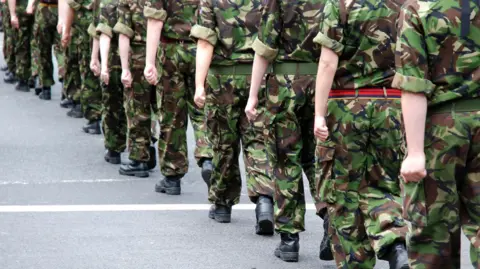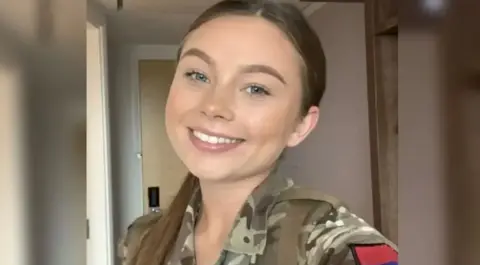Hundreds of women allege sexual abuse during army medicals

Jonathan Beale,Defence correspondent and
Christopher Mace,West of England
 BBC
BBCHundreds of women who served in the British Army have come forward and alleged they were sexually abused while undergoing medical examinations during recruitment.
Wiltshire Police is carrying out a nationwide investigation relating to medical checks carried out between the 1970s and 2016, which the Ministry of Defence says it is supporting fully.
Defence sources have told the BBC medical examinations at the time were carried out by contracted doctors.
The force said it was yet to identify suspects, but alleged abuse is thought to have taken place at multiple locations.
Military police were first alerted to the allegations and handed the lead on the investigation to Wiltshire Police earlier this year, after the scale of the complaints became clear.
Hundreds of women have already come forward with allegations of sexual abuse while undergoing medical examinations to join the Army.
Wiltshire Police said their enquiries to date have revealed “non-recent” offending spanning several decades at various army locations.
The Ministry of Defence said it is alarmed by the allegations and praised those who have come forward for their bravery.
The department also urged anyone with more information to contact Wiltshire Police.
It is not yet clear whether this investigation will be expanded to include women who joined the Royal Navy and RAF.
‘Power structure’
Gemma Morgan, who works with organisations to improve life for women in the Armed Forces, said she was “aghast” at the report findings, but “not surprised”.
Author of the book Pink Camouflage, she said she experienced sexual abuse, harassment and misogyny during her time in the military.
Ms Morgan told Radio 4: “With military sexual trauma, it is unique in many senses because there is this hierarchical power structure. It is a closed environment and you have limited access to justice, or even support systems, because the Army is completely in control.
“They can end your career overnight and too often you become the problem if you raise your hand and ask for help.
“Your army medical is often the first experience you have, it is your first touch point really where either the gates will be open or shut depending on if you’re allowed in or not. I’m aghast at some of the details with these reports but not surprised.
“I think there have been changes, absolutely, but it needs to go beyond policy changes.”
 Family handout
Family handoutMs Morgan pointed to cases such as Jasley Beck, who was took her own life in her barracks at Larkhill Camp in Wiltshire on 15 December 2021, and Olivia Perks, in Berkshire in 2019.
Professor Anthony King, of war studies at the University of Exeter, conducted a report in 2022 into the experiences of women in the British Army. It was not published at the time, and only came to light this year via an Freedom of Information request.
He told Radio 4: “Clearly this is a deeply disturbing situation, the fact it happened on army locations suggests, probably ensures, there is some army culpability here. [It is a] very serious case.
“You’ve got to try and make the Army a place that is accepting, where women are integrated as full members of combat teams and military teams, with the fact they are in the mass minority.
“It is not easy, but I think with a series of organisational transformations, you can improve the situation.”




